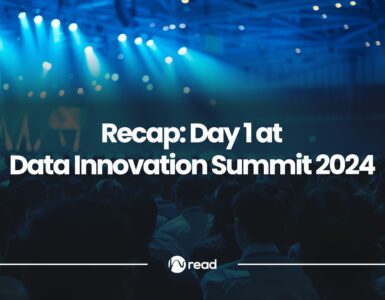One of the industries where AI has found vast application is in banking. Banks have discovered some really valuable AI use cases: fraud prevention and fraud detection, credit underwriting decisions, customer service automation via chatbots, risk management, decreasing manual workload, and so on. Swedbank is one of the banks at the AI adoption forefront. At the Data Innovation Summit 2020, Mehrdad Mamaghani, Principal Data Scientist and Head of R&D A&AI at Swedbank will present some of the work they do with AI and state-of-the-art AI solutions that are transforming banking but are as relevant for other industries as well.
Hyperight: Hi Mehrdad, we are very happy to have you as a speaker at this 5th Celebrate edition of the Data Innovation Summit. To start, please tell us a bit about yourself and your role at Swedbank.


Mehrdad Mamaghani: Thanks, glad to participate! I am a statistician from the classical branch of mathematical statistics turned into a data scientist. I am also Head of R&D at Swedbank’s Analytics & AI, Swedbank’s Analytics Centre of Excellence.
I studied mathematical statistics at Uppsala and Stockholm University, spending most of my PhD years working closely with system biologists at Karolinska Institute. I began my industrial life by spending two years in the pharma industry. I spent another two years venturing into market research, communication and consulting. Then, I found an intriguing position at Swedbank and have now spent two years here, in a rapidly developing environment. I work here with a diverse team of polyglot, polymath and very creative people.
During these two years, we have gone from intermediate-level business analytics to advanced applications of deep learning, using a mixture of on-prem GPU platforms and cloud infrastructure. Adding to this, we have the growing need of delivering end-to-end solutions with efficient, reliable and scalable deployment and monitoring schemes.


Hyperight: The topic of your presentation is Beyond interest rates and trading: everyday AI @ Swedbank. What are the challenges that these machine and deep learning solutions are expected to solve in banking?
Mehrdad Mamaghani: Like many other banks, Swedbank is going through a transformative period. As stressful as big transformations can be, they also present fantastic opportunities for innovation and taking significant leaps forward.
As Swedbank’s Analytics Centre of Excellence, we serve the entire bank, so the main challenges can be divided into improving customer experience and general development of banking operations.
Hyperight: Talking specifically about Swedbank, where does AI finds its application and what are the most prominent use cases?
Mehrdad Mamaghani: In the customer experience domain, we can use machine learning to shorten our customers’ waiting times, both in the telephone queue and for mortgage approval. We can also transform the entire daily banking experience to make it meet our customers’ specific needs and future aspirations by providing tailor-made services and saving plans.
Within general banking operations, we use machine learning to decrease the number of tedious tasks for our colleagues, for instance, by using computer vision techniques. We also help to strengthen the foundation on which the bank takes risk-related decisions. Most importantly, however, we help to equip the bank in combatting financial crime and fraud targeted at our customers. The latter area is of paramount importance due to its implications for our customers, the bank itself and society at large. Using AI to combat crime is as close to an “AI for good” application as one can get.
Within banking, we will continue to share knowledge with our customers and society on the usage of data. We believe that increased citizen knowledge on data ownership and data usage is key for increased trust and for fighting crime.


Hyperight: What are the challenges with deploying these ML and DL solutions? How do you overcome them at Swedbank?
Mehrdad Mamaghani: There are several. However, all these challenges are blessings in disguise; well, actually, very little disguise.
Firstly, we work in a regulated environment, meaning that black box solutions will not fly. So, we cannot take any shortcuts but must follow the scientific method by formulating clear hypotheses and asking for relevant evidence. If we absolutely need a model that is not so generous with explanations, we employ one of our additional interpretability techniques to obtain translatable results. By doing so, we ensure that our labour solves an actual business problem rather than a data problem.
Secondly, and something that I am most grateful for, we have GDPR. It makes all the sense in the world that the ownership of data lies with the creator of that data and not the user. For us, this means that, unlike businesses outside of the EU, we cannot throw data at a problem and hope for the best. Our business hypotheses, data usage, models, and results are well-thought-out and designed to protect customer privacy.
Both perspectives above are of instrumental weight to guide data science in an actively thinking and scientific direction rather than a race to the bottom in handling increasing loads of data and endless training epochs.
Lastly, due to a growing rate of obsolescence, we have ever-increasing demands for the right type of compute power and software stack flexibility in our technological platforms. We are venturing into cloud technologies, that give us access to the latest tools and allow for highly flexible rescaling. They also liberate the data scientists from a lot of cumbersome tasks and provide time for creativity and monitoring.


Hyperight: And lastly, what are your future outlooks when it comes to AI applications in the banking industry? What can we expect in the next 5-10 years?
Mehrdad Mamaghani: I am not a crystal ball kind of person, but I can at least say what I would like to focus on in the immediate future.
I think we as practitioners need to be clearer with what AI can and cannot do – no, this won’t cause an AI winter. There are still far too many who believe in the concept of “singularity” and some sort of hostile machine take-over. Human intuition and reasoning are still far superior to anything that our most advanced applications of AI can muster. Machines are fantastic tools, but they remain what they are: machines created and governed by humans. Therefore, the responsibility does and will always lie with the human operators – concerning all aspects of hypothesis formulation, data usage and interpretation of results. In a nutshell by John Tukey: “An approximate answer to the right question is worth a great deal more than a precise answer to the wrong question.”
Within banking, we will continue to share knowledge with our customers and society on the usage of data. We believe that increased citizen knowledge on data ownership and data usage is key for increased trust and for fighting crime.
More generally, AI has the capacity to provide the necessary tools for transforming daily banking for individuals as well as businesses into a platform for adequate economic planning. In a broader context, AI solutions can guide societies to act responsibly in the present, plan thoroughly for the future, and support actions that are more likely to guarantee a sustainable outcome, financially as well as ecologically.














Add comment